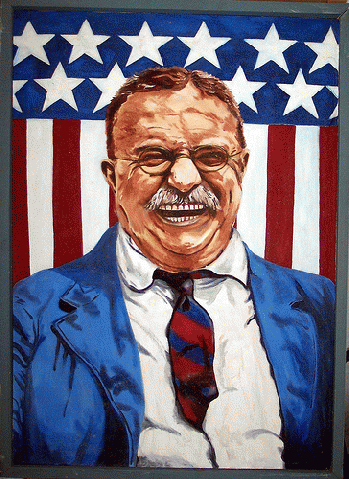The "Bully's" Pulpit
In the past year, Theodore Roosevelt's characterization of the presidency as a "bully pulpit" for moral leadership and political uplift has been twisted into something far different and far more dangerous.
Not content with his campaign of schoolyard name-calling against political rivals ("little Marco," "crooked Hillary"), Donald Trump, as president, has graduated into using his elevated position to issue demeaning taunts about North Korean dictator "little rocket man," to intimidate him, and most recently into declaring twitter-warfare with him by comparing the size of their respective nuclear buttons. A bad joke at best; at worst a terrifying threat of planet-scale nuclear annihilation demeaning to the Office and ultimately destructive of America's remaining stature as a trustworthy world leader.
He has employed that same presidential pulpit to regularly disparage the integrity of entire government agencies such as the CIA, FBI and the Justice Department, railing against responsible government officials and news media ("fake news") when they won't accede to his latest whims or accept his version of "alternative facts." In a stream of attacks against minorities, immigrants and legitimate protestors, he has turned the moral force of the presidency against those who are often most vulnerable, further dividing rather than uniting the nation.
These are the actions of a bully, the likes of which the country has not seen on thenational stage since the meteoric rise and fall of Senator Joseph McCarthy in the 1950's. In that pre-internet world, McCarthy, like Trump today, showed an instinct for manipulating the national media, managing to dominate news cycles and public attention by stoking public fears about foreign and domestic 'enemies' hard at work undermining major national institutions.
Significantly, the career of the country's most infamous demagogue ended not with a bang but with a whimper. Censured at long last by the Senate on December 2, 1954 by a bi-partisan 65-22 vote for inexcusable and insulting" conduct "unbecoming a senator," Joe McCarthy slowly lost political influence, sank deeper into alcoholism, slunk off the public stage and died in 1957 at the age of 48.
His fall followed a three-year reign of terror in which he increasingly misused his position as chair of the Senate Permanent Subcommittee on Investigations to attack, publicly indict and essentially persecute and ruin the names and careers of those called before the committee. Aided by his chief counsel, Roy Cohn, and protected by political allies in congress as well as the climate of fear his attacks engendered, McCarthy's fame soared despite his wild, often unproven charges, use of innuendo, outrageous lies and technique of bullying and browbeating witnesses.
Two decisive moments in his downfall stand out in the historical narrative, both important lessons to heed in handling bullies of any stature. McCarthy's ultimate unraveling came in an attack on the integrity of the U. S. Army for allegedly coddling subversives and led directly to the nationally televised clash between the Senator and the chief lawyer for the Army, Boston attorney Joseph Welch. In front of an audience of millions, after watching McCarthy attempt to smear a young attorney in Welch's practice, Welch finally pronounced the unforgettable judgment which at long last publicly captured McCarthy as the bully he was, "Have you no sense of decency, sir. At long last, have you left no sense of decency?"
(Note: You can view every article as one long page if you sign up as an Advocate Member, or higher).





